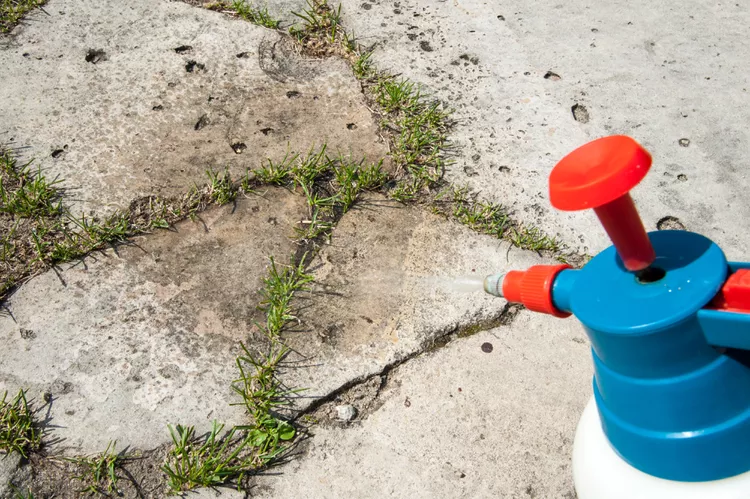Does Bleach Kill Weeds? Yes, But Here's Why You Should Never Try It

The internet is filled with home remedies for killing weeds. These DIY concoctions are touted as safer, more affordable, and more natural than commercially prepared herbicides. One of the most common DIY weed killers mentioned is bleach. You might find the advice to just mix it with some water, spray it on weeds, and they will be deader than a doornail. But given that bleach is a powerful chemical, is that really a good idea?
We asked an expert to weigh in on bleach as a weed killer. Long story short: Yes, bleach kills weeds, but that doesn’t mean you should use bleach as a weed killer. “I cannot say this strongly enough: You should not use bleach to kill weeds,” says Ralph Mitchell, director of the University of Florida Extension Office. “Keep bleach out of the garden and in the laundry room.”
Ralph Mitchell is the director of the University of Florida’s Extension Office in Charlotte County, Florida, where he leads a comprehensive horticultural program.
Will Bleach Kill Weeds?
Bleach will kill weeds because it’s toxic to all living things. It’s formulated to kill germs and algae, so it has no problem killing your pesky dandelions, crabgrass, and bindweed. If you spray diluted bleach on a weed, the liquid will soak into the soil and kill the plant, roots and all.
Undesirable Side Effects on Soil
Here’s the problem, though. “Bleach hangs out in the soil longer than you want it to,” Mitchell says. “It will kill weeds, but it can cause other damage to your garden.” Bleach has a high pH level, and it can make your soil too alkaline to grow plants. When bleach breaks down in your soil, it leaves behind salt, which is harmful to plants. There’s collateral damage when you use bleach as a weed killer. You killed the weeds, but you may have done lasting damage to your soil.
Bleach can burn eyes and skin, so protective clothing such as gloves and safety glasses are recommended when handling it.
Is It Safe to Use Bleach on Patio Weeds?
Bleach is often extolled as a way to kill weeds that pop up in the cracks between patio pavers and the seams of concrete driveways. There’s no soil to damage, goes the logic, and you’ll prevent weeds from growing back. The problem is that runoff from rain can wash the bleach into your yard or garden, damaging soil in places where you want plants to grow. Bleach is also toxic to fish and other aquatic life that can be harmed if the chemical washes into lakes, streams, or storm drains.
Read the Label
Mitchell stresses that you shouldn’t use products in ways they are not labeled for. Bleach is not labeled for use as a weed killer. Herbicides are labeled for use as weed killers. Defer to the expertise that went into crafting those labels, he says. “It has taken millions of dollars and lots of clinical trials to make sure that a weed killer works properly,” Mitchell says. “That label is a legal document and a well-informed set of instructions. Pay attention to it.”
Better Ways to Kill Weeds
If you are looking for a natural alternative to commercial weed killers, there are better options than bleach.
- Pull weeds by hand. You benefit from the exercise, and it’s therapeutic.
- Once you get the weeds under control, mulch, mulch, mulch to prevent them from coming back. Plus, the mulch enriches your soil as it decomposes.
- Make sure the plants you grow are so vigorous they can outgrow the weeds. “A patch of healthy plants growing almost shoulder to shoulder can shade out the weeds, so the weeds never have a chance of growing,” Mitchell says.
- Use micro-irrigation, where water is directed at the roots of the plant that you want to grow with drip lines or soaker hoses. “That way you are not watering weeds,” Mitchell says.